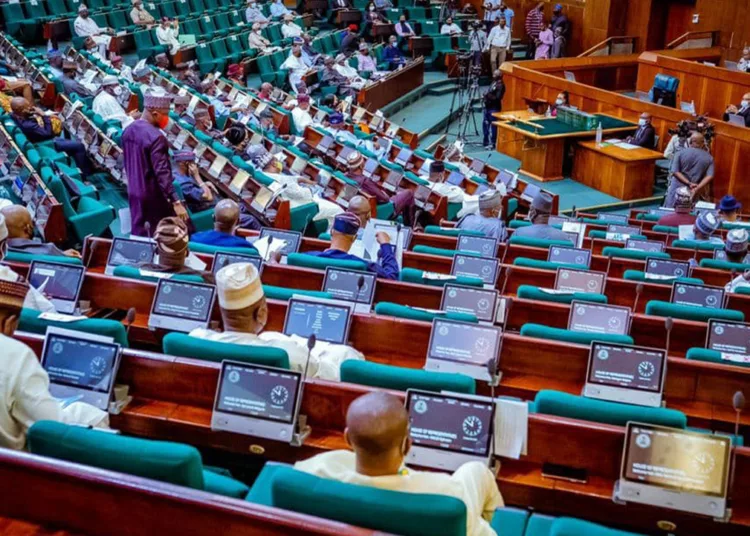The House of Representatives has resolved to investigate the allegations of abuse of tax incentives, tax breaks and tax waivers by public institutions and companies benefitting from such incentives, leading to loss of N14 trillion revenue.
The House also took steps to limit crude oil lifting contracts to companies quoted on the Nigerian Exchange Group.
This was sequel to the adoption of a motion moved by Hon. Oluwole Oke at plenary on Thursday when he argued that Nigeria loses about N8 trillion annually to tax incentives and waivers and N6 trillion to companies that abuse the system.
Moving the motion, Oke said the federal government of Nigeria exercise monetary and fiscal controls over the economy to stabilise both micro and macro-economic conditions and fundamentals over items in the exclusive Legislative List contained in the Second Schedule to the Constitution of the Federal Republic of Nigeria, 1999.
He said some of the tools available to monetary and fiscal policy authorities to tinker with the economy and stimulate economic activities in some sectors of the economy are tax waivers, tax breaks, tax exemptions and tax incentives. “Recalls historically that the federal government had issued policy documents in line with its fiscal goals and strategy, for example, the annual issuance for the Fiscal Policy Measures by the Ministry of Finance, the periodic issuance of the Value Added Tax Modification Order, etc. Some of these policy interventions had been effective in the past in achieving part of its objectives.
“Further notes that available data also shows that while the Federal Government has good intentions, these practices have and continue to create a major black hold in the purse of the Government of the Federation. These losses are occasioned and driven primarily by abuses by Companies that have been granted tax-based waivers and incentives.
“Again notes that based on available data, Nigeria continues to lose about 8 Trillion Naira annually to tax incentives and waivers. About 6 Trillion is lost to companies that abuse the system, while 2 Trillion worth of waivers achieve’ the objective of the federal government.
“Most of the abuses arising from fiscal items like capital allowances, Investment Allowances, Pioneer Status Incentives, Free Trade
Zone exemptions, Value Added Tax Exemptions, etc,” he said.
Oke expressed concern that if urgent steps are not taken to investigate the situations, Nigeria may not only be hanging on a fiscal cliff but heading to Venezuela, which is a situation “where a country has huge resources but is in deep economic crisis, recession and depression.”
Adopting the motion, the House resolved to setup an Ad-hoc Committee to investigate the allegations and report back within four weeks for further legislative action.
Meanwhile, the House resolved to constitute an Ad-hoc Committee to investigate and identify Oil and Gas Companies favoured to lift Nigeria’s Crude Oil and put in place effective mechanisms to which companies will be quoted in the Nigeria Exchange Group (NEG) and report back within four weeks.
That followed the adoption of a motion moved Hon. Ghali Mustapha Tijjani at plenary on Thursday, noting that the oil and gas sector is the backbone of Nigeria’s economy and its global prominence and contributions cannot be overemphasised.
He noted that the sector lacks effective governance and falls short of transparency and accountability, due to the operations of briefcase companies which add no tangible value to our economy.
The lawmaker also noted that these briefcase companies are inexperienced and without the required financial, commercial capacity and expertise in the crude oil business.
“Conscious that the widely publicised Nuhu Ribadu-led Petroleum Revenue Special Task Force found among other things, that Nigeria losses billions of Dollars monthly due to activities of the briefcase companies that lift Nigeria’s crude oil.
“Cognizant that the facts have been corroborated by other credible bodies including the Nigerian Extractive Industries Transparency Initiatives (NEITI), Natural Resource Governance Institute (NRGI), Chatham House Report of 2013, Civil Society Legislative Advocacy Centre (CISLAC) and the Centre for Research on Multinational Corporations (SOMO).
“Observes that these companies and their collaborators have become resistant and adamant, and have continued to operate unabated to short-change Nigerians, despite many recommendations to do away with them.
“Concerned that only a negligible number of oil and gas companies registered with the Nigerian Exchange Group, despite the global prominence of Nigeria’s oil and gas industry.
“Envisaged that listing these companies on the Stock Exchange will curb the incessant revenue loss and will create capital availability to the economy. Furthermore, it will allow the regulatory authorities to have greater control over their activities,” he argued.
Meanwhile, the House agreed to investigate the utilisation of ecological funds released to the Great Green Wall by the International Organisations from 2015 to date.
It also resolved to set an Ad-hoc Committee to probe all federal allocations to the National Agency for the Great Green Wall (NAGGW) as well as contracts awarded to various contractors for the project from 2015 to date.
The Committee is further mandated to investigate the total sum received through the policy and the level of compliance with the goals and objectives of the project and report back within four weeks for further Legislative action.
These resolutions were sequel to a motion moved by Hon. David Abel Fuoh, Hon. Zacharia Nyampa
Hon. Shetima Ali Lawan and Hon. Olusola Fatoba at plenary.
Moving the motion, Fuoh said: “The Great Green Wall Initiative for the Sahara and Sahel Programme was initiated and adopted by the Head of Governments and States of the African Union in 2005 to address the issues of desertification, land degradation, Bio-diversity loss, promote climate change resilience by ecosystems and communities and improve food security in about 21 countries of the Sahel region in Africa
“The National Agency for the Great Green Wall (NAGGVW) is a Nigerian federal agency under the Federal Ministry of Environment, established to address land degradation and desertification and support communities to adapt to climate change in the Nigeria States of Sokoto, Kebbi, Katsina, Adamawa, Bauchi, Borno, Gombe, Jigawa,Yobe and Zamfara.
“Concerned that from the findings, Š4 billion commitment was joint support from France, African Development Bank (AFDB), Global Environment Facility ($115, million), World Bank ($1.9 billion) and aid from some African Leaders, in 2015 during COP 21, the (AFDA) President, Dr Akinwumi Adesina revealed that the Bank has so far released $22 billion for the project and pledged to mobilise an additional $50 billion to provide clean energy for Africa including the Sahara-Sahel region.
“Also concerned that the United Nations Convention to Combat Desertification (NNCCD) through Joint Support Commitment made available $8 billion to support all 20 African countries including the 11 primary nations and Nigeria’s 11 front-line states.”











